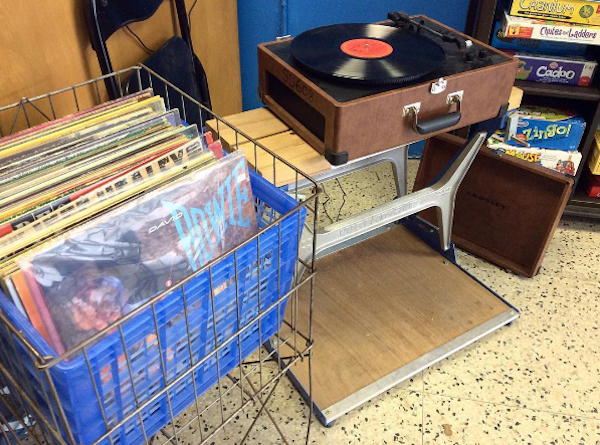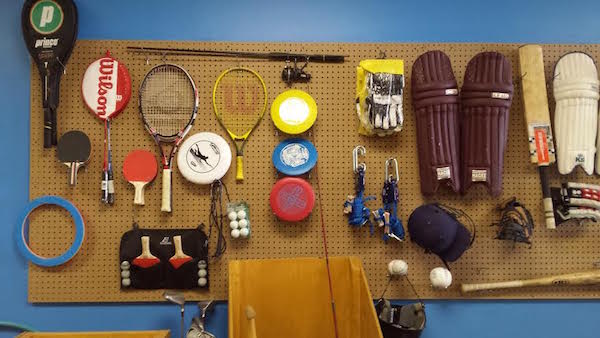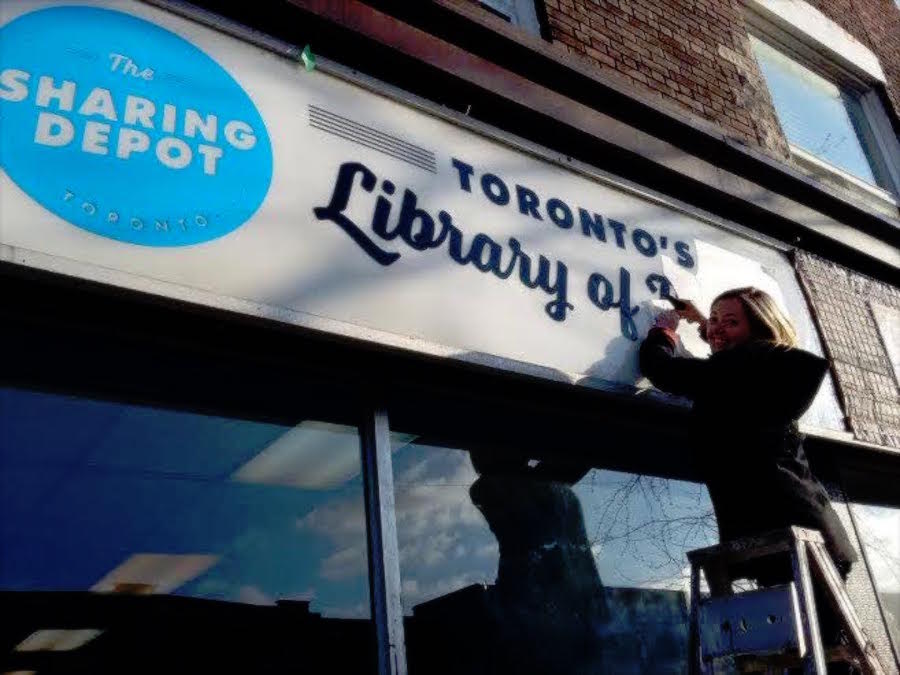When the first Toronto Tool Library was launched in 2013, the project was so well received by the local community that it quickly grew to four locations and over 25,000 loans with a near 100 percent return rate.
Last month, the Toronto Tool Library team launched the Sharing Depot, Canada’s first library of things where, for $50-$100 per year, members can borrow camping and sports equipment, house party supplies, board games and toys. The project highlights the growing library of things trend and serves as a model for other organizations looking to grow the sharing movement in their town.
Shareable spoke with Lawrence Alvarez, president of the Institute for a Resource-Based Economy and co-founder of the Toronto Tool Library and Sharing Depot, about the growth of the library of things movement, being freed from the burden of ownership, and the importance of municipal support for sharing projects. Here are the highlights of our conversation.
Shareable: We’re seeing the library of things movement gain momentum. What do you think is behind this movement?
Lawrence Alvarez: This trend is born from a few different angles. One of the primary motivations is this movement toward DIY maker culture. People want to be empowered to do their own projects. They want to take control of their lives in different ways, and these projects are an avenue to do that—to take that camping trip they weren’t able to, to fix that sink that would have cost them an arm and a leg to hire someone to do when they just needed one specialized tool, to play that board game that was always too expensive for them to get.
Another motivation is the money savings. People see that instead of spending money on something, they can just go borrow it for a few days.
The third motivation, which personally drives me, is this universalist outlook of looking at the whole earth as a glass that holds the only water we can drink. At the moment, we’re handling it quite carelessly and it’s spilling all over the place. There’s a realization that that is the only water we can drink.
I think a lot of people realize that we’re like a hiker climbing a mountain. We have a backpack, and we have all our survival things in that backpack, and there’s nothing else. The mountain is devoid of life, just like the void around our earth is devoid of life, at least within reachable distance.

The Sharing Depot lends out house party supplies, including turntables and records.
What do you see from your perspective inside this library of things movement?
There is never a bad thing to say. No one ever has anything negative to say about it. When people come in, they’re excited, they’re inspired by the things they see in the space. A lot of them are shocked that they can take out these things. It’s perhaps never occurred to them to extend the concept of a library to other things. But, once people are introduced to the concept, they pick it up right away.
There’s an initial shared wonder at everything they can do and take out at such a cheap price. It’s quite rewarding to be part of this project. People are extremely happy and extremely supportive. In fact, we have an overflow of volunteers and we’re struggling to find shifts for all the volunteers.
What was the inspiration for the Sharing Depot? How did the success of the Toronto Tool Library affect it?
In 2011, we started the Institute for Resource Based Economy. We were a bunch of environmental activists who started this organization with the express purpose of applying for grants to get money to do concrete projects and provide people with a parallel to this otherwise dominant, consumptive, wasteful society.
Then we discovered the Berkeley Tool Library in 2012 and knew that’s what we wanted to do in Toronto. We opened the first location, with just $5,000 in March of 2013. It was like receiving a standing ovation from the community of Toronto. Everyone was like “Yes, of course!”
After a couple of months we decided that we should absolutely just surf the wave of momentum that was building around the idea of these shared spaces. Within six months of the first space, we opened a makerspace on the east side of town, with programming and activities for kids.
Following the wave of that, we started discussions with the Toronto Public Library, which is one of the largest and busiest in the world, with 18.5 million visitors per year and 10 million items. At the beginning of the discussions, we were really small but we started to get a little bit of clout. When we finally got in front of the head librarian and her team, they asked us, “What do you want?”
We shot for the sky and said, “We want to open a tool library branch inside one of your public libraries.” They kind of looked at each other and were like, “OK, that sounds like a good idea.” We opened that in April 2015 and, toward the end of last year, we opened a small express location inside STEAMLabs, a local makerspace.
Last year, shortly after we opened in the library branch, we had a visit from Rebecca [Trevalyan], from the London Library of Things. She was able to allay our concerns and give us a lot of insights. We starting doing some heavy research and building the groundwork. We identified five categories of things we thought people would really like to share: toys, camping gear, house party supplies, sports equipment, and board games.
The building our makerspace was in had space available so we moved the tool library upstairs, to the street level, with the library of things, and expanded the makerspace downstairs. We launched a crowdfunding campaign earlier this year and raised $30,000 in 30 days for inventory, rent, insurance, and to renovate the space and make it beautiful. We launched on April 28th.

Toronto has a vibrant sharing ecosystem, with makerspaces, tool libraries, car and bike sharing, a fantastic public library system, and now, the Sharing Depot.
How are you approaching this shift to loaning other goods besides tools?
It’s an experiment, to be honest. We paid six months of rent and we’re going to see what happens—what is Toronto going to do. With the first tool library, we had no idea what was going to happen or if people were going to use it. It so happened that it exploded and took over our entire lives. It was beautiful and amazing and inspiring.
We’re not sure what’s going to happen with the Sharing Depot. I’m pretty confident that people will jump onboard, but it’s all about timing. I think Toronto is poised to be a really good space for sharing projects so I feel confident that it will work really well.
The beauty of these projects, if you will excuse the term, is they’re kind of like gateway drugs. If you share all of these things that you don’t need to own, if you just have experiences over ownership, and access over ownership, then what does that mean for everything else? Do you need to make as much money?
Previously you had to buy all these things: your own car, and your own camping set, or your own popcorn maker. What about now? What if you’re freed from the burden of ownership? What does work look like in that setting?
When I ask myself what it means to live a full life, I ask, how can I acquire those things without having to buy them? Can I collaboratively share all of those things with my community? I’m wealthy beyond all belief. I have about $15,000 worth of stuff but I don’t have to keep it.

No need to purchase your own sports equipment, you can simply borrow what you need from the Sharing Depot.
I understand that the Sharing Depot was crowdfunded but that the Ontario government and the City of Toronto have both been extremely supportive of the Toronto Tool Library. What role do you see governments playing in the sharing movement?
In the time we are in, we can see the devastating impact that consumer culture and individualism has on our climate, our relationships, our society. It is high time that cities, states and provinces, say, ‘Shared resource hubs are the way for us to enrich our community, for us all to have as much discretionary income as possible, to enliven our spaces.’ It is high time.
What does an average day at the Sharing Depot look like? Do people come in just to check it out and leave members?
On an average day, I arrive, open the door, turn on the open sign, throw a record on, crank it up, and people come in. There are three kinds of people: the first are those who have never seen the space. They’re wondering, “What is going on here? You can borrow these things?” And I’m like, “Absolutely, you wonderful human. Thank you for coming into our space. You can absolutely borrow all of these things for $50-$100 per year.”
Then, as I’m talking to this person, someone will come in with an armload of tools to return. Our tool library is extremely busy. Seldom is there a drill on the wall. In that location, there are a lot of homeowners and a lot of fixer-upper houses.
The third type of person comes in specifically to take out things. They’re already a member.
Then, donations come in more or less every shift.

Sharing Depot co-founder Lawrence Alvarez (right) is optimistic about the future of the library of things.
What are the challenges now that the Sharing Depot is up and running?
The biggest challenge is just the humans we have to throw at this problem of figuring out the policies and stocking the space. This is a gigantic volunteer gig for everyone, so it’s just finding the time between work and the time when you’re recharging your own batteries. We pull late nights at the Sharing Depot, then get up early to go to work.
The lucky thing for us is that we all live together. All of the people who are involved in the project live in one house. I attribute the success of the Toronto Tool Library and the Sharing Depot directly to being in the space together. We’re able to move so quickly because we can have meetings any time. It can be challenging sometimes, but, we’re rewarded when people come in and say, “You mean, I can borrow these?”
What’s your big picture vision for the Sharing Depot? If everything goes really well, what would you most like to see?
I would love to see something called the Sharing Mall. Imagine a giant department store except, instead of going in and having to purchase all of these things, you go in and can borrow everything.
Imagine a warehouse where you’d be able to take out a bike trailers, and there’s a huge camping section, a tool section, house party supplies, there’s a specialty book section for textbooks or manuals, another section for musical instruments, and a section for sewing machines. Just for being a resident of the city, you’d get access to this.
I imagine the Sharing Mall being a city, province or country-funded thing, or maybe a very basic membership of $50-$100. That is the future, to take sharing things to such a level that it becomes like a giant department store where you can go take out everything that you want under one roof. Maybe we would have multiple of these just on the outskirts of the city.
Or, another version I see is that libraries around the world start to more aggressively adopt things into their inventories. They already have the staff, the funding, the system for inventorying the stuff.
It would take a bit to get it up and running, but, in one hundred years, to have those humans still have things on this planet that they can use to animate their lives—to make life as easy and amazing as possible for those people, who are my family as well as yours, is the point. To maximize them to their full potential while doing justice to this beautiful, incredible miracle upon which we live. Sharing is the way of the future.
##
Follow @CatJohnson on Twitter









